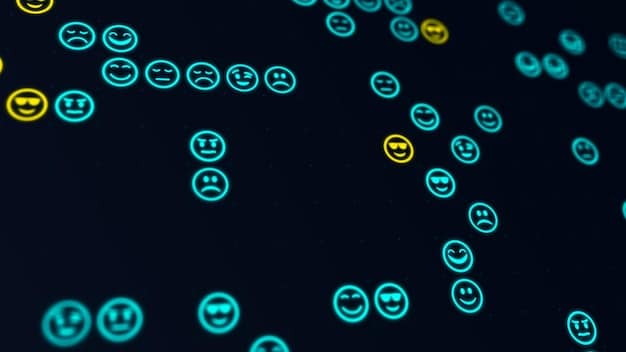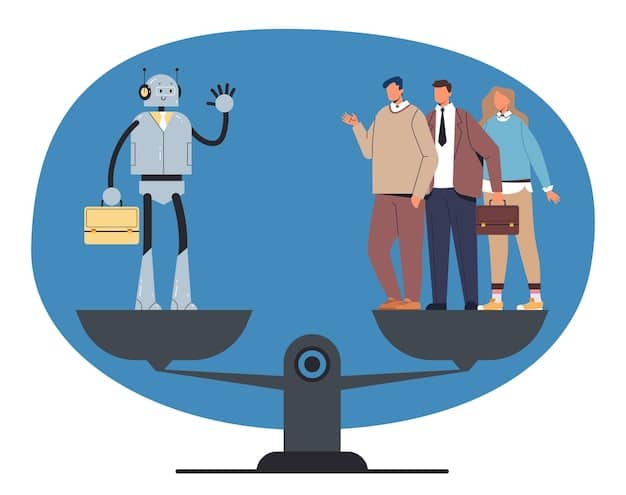The Future of Movie Reviews: Will AI Change Film Judgments?

The Future of Movie Reviews: Will AI Change How We Judge Films? examines the transformative potential of artificial intelligence in reshaping how movies are reviewed, affecting traditional critical analysis and audience engagement.
The landscape of The Future of Movie Reviews: Will AI Change How We Judge Films? is rapidly evolving, prompting us to consider the implications and possibilities that lie ahead.
The Rise of AI in Film Criticism
The integration of artificial intelligence into various aspects of our lives has prompted questions about how AI might reshape human endeavors. One area of particular interest is film criticism.
As AI continues to evolve, its potential impact on the way we consume and interpret films is becoming increasingly evident.
Automated Review Generation
AI algorithms can be trained to analyze films based on various parameters and generate reviews automatically. This capability raises important questions.
Sentiment Analysis and Audience Prediction
AI can also perform sentiment analysis on social media and other online platforms to gauge audience reactions to films. The integration of AI analysis can offer predictions.

The use of AI in sentiment analysis is transforming how the studios are working with audience engagement.
- Objectivity and Bias: How can we minimize bias in AI-generated reviews?
- Impact on Human Critics: What role will human critics play in the future of film criticism?
- Evolution of Film Analysis: How might AI change the way we analyze and understand films?
As AI technologies become more sophisticated, the industry should monitor human critics and provide the necessary changes in film criticism.
AI’s Impact on Traditional Film Criticism
The introduction of AI into film criticism has potential. However, it is a challenge to the traditional roles and methodologies of human reviewers.
Adapting to new technologies and continuing to offer unique value will be crucial for film critics in the era of AI.
Changes on the role of Critics
AI’s capacity to quickly evaluate and generate insights from films can disrupt current practices.
The need for adaptations
To stay relevant and meaningful, critics may need to evolve their skill sets and concentrate on areas where AI lacks.
- Adapting to New Technologies: How can critics leverage AI as a tool to enhance their work?
- Maintaining Independence: How can critics ensure their perspectives remain independent?
- Expanding Skill Sets: What new skills will critics need to thrive in the age of AI?
The capacity to write well and to conduct a complex review is going to be a valuable skill in the field of film critics.
Ethical Considerations
As AI gets more integrated into movie analysis, moral and ethical issues need to be considered to avoid issues.
Maintaining transparency, honesty and user rights will be crucial to guarantee the integrity of assessment in the age of machines.

Unveiling Algorithmic Bias
AI algorithms can unintentionally perpetuate discrimination and biases that are present in the information it is fed during training.
Transparency and Accountability
Accountability and transparency are essential in AI implementation to guarantee fairness.
These are ethical issues that need to be considered:
- Bias Amplification: How can we prevent AI from amplifying existing biases in film criticism?
- Transparency in AI Usage: How should AI be disclosed in the review process?
- Data Privacy and Security: How can we protect user data while leveraging AI in film criticism?
AI systems should be well managed to make sure they are fair, and that their choices are not prejudiced by any means.
The Audience Perspective
The accessibility to film reviews will be affected by AI. The general audience will benefit if they understand this new technology.
How audiences accept and use AI driven review platforms will impact the overall environment for movie analysis.
Adapting to New Trends
The availability of AI may change how audiences locate, assess, and talk about movies.
Challenges
The abundance of possibilities presents the challenge. However this is a challenge that the majority may face.
Critical audience concerns:
- Discovering Films: How can audiences use AI to find films that align with their tastes?
- AI Personalization: What are the risks and benefits of using AI for personalized film recommendations?
- Critical Thinking: How can audiences maintain their critical thinking skills in the age of AI?
As innovation advances, it is vital that people critically assess data and base judgements around their preferences.
The Future of Human-AI Collaboration
The future film analysis is likely to be a collaboration where people and machines work together to produce rich and insightful critiques.
The integration of the two skill sets is useful for the viewer in the film community.
Augmented Analysis
AI increases people’s abilities to evaluate movies. It can offer sophisticated data analysis to reinforce critical views.
Synergy
In the best case scenario there is synergy between machines and critics that enhances the overall examination.
Ways that humans and AI can collaborate:
- AI tools can help critics in researching films, finding trends, and doing factual checks, which saves time and effort.
- AI will help critics in assessing viewers views to get a sense of the market.
- By incorporating these tools, critics may broaden the scope of film evaluation and give viewers more comprehensive data.
The integration of these tools will give the viewers more insightful critiques overall within the market.
Preparing for the AI Revolution in Film Criticism
People must be prepared and equipped to deal with the unavoidable changes that AI would bring upon film analysis.
By embracing training, education, and cooperation, we are more likely to be ready for a future in which AI and human knowledge coexist to enhance our understanding of cinema.
Adaptation
Keeping up with the newest in AI technology and applications is important for both film enthusiasts and critics.
Learning
Educational alliances could provide people the skills and information they need to successfully traverse the changing environment of film assessment.
Steps to prepare for the AI revolution:
- Stay Informed: Keep up to date on the latest advancements in AI and film criticism.
- Engage in Dialogue: Participate in conversations.
- Promote Media Literacy: Encourage critical thinking and media literacy among audiences.
Open conversation about the impacts of AI in film is likely to affect the sector.
| Key Point | Brief Description |
|---|---|
| 🤖 AI in Film Criticism | AI is automating reviews and analyzing audience sentiment. |
| ✍️ Traditional Critics | Critics need to adapt by using AI tools and maintaining uniqueness. |
| ⚖️ Ethical Concerns | Transparency and accountability are essential when using AI. |
| 🤝 Human-AI Synergy | Collaboration can enhance movie evaluation. |
FAQ
AI is automating aspects of film review, analyzing data to produce reviews. This includes sentiment analysis and predicting audience reactions, speeding up the process.
Critics must continue to adapt to new advances in tech. This includes emphasizing skills like in-depth analysis and leveraging AI tools to improve their work.
It is crucial that algorithms are free of prejudices. This can be done by transparency, frequent audits, as well as a dedication to justice to counteract bias.
AI algorithms assist audiences in finding films by customizing suggestions depending on preferences and earlier viewing habits, therefore improving the discovery process.
Viewers should have open minds, think critically, scrutinize viewpoints, and use media analysis methods to discover cinema in all of its richness and nuance.
Conclusion
The rise of AI in film criticism signals a major paradigm shift that holds both opportunities and issues. By embracing morality, cooperation, and lifetime training, we can traverse the AI-enhanced future of film analysis and retain our excitement with the marvels of cinema.





